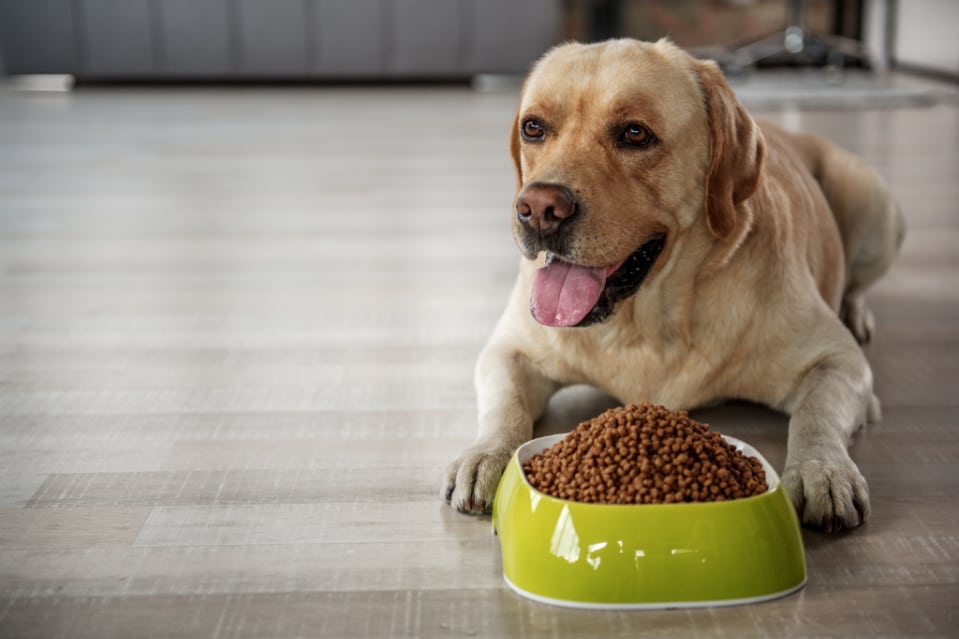
Labrador Retrievers are a breed with a reputation for being gentle and highly energetic. In spite of this, Labrador obesity is a problem that has proliferated in the past few years.
Read on to know a few basic things about Labrador obesity.
Causes of high obesity rates in Labrador
1) POMC gene
Although Labrador obesity may result from several factors, their pro‐opiomelanocortin (POMC) gene is said to make this breed of dogs more prone to obesity.
According to a recent study, the POMC gene contains coded proteins that signal the brain to indicate that our canine companion is no longer hungry.
Researchers discovered that Labs actually have variants of this gene, which were strongly linked to Labrador obesity, appetite, and weight.
Nevertheless, it is important to note that there are still not enough scientific studies to definitely state that the PMOC gene is one of the causes of obesity in Labrador.
2) Excessive food intake
Dog owners tend to overestimate the food intake needs of their dogs. As delightful as it is to be able to see how much a hungry Labrador can eat, most Lab owners tend to put too much food in their pet’s bowl.
Sometimes, you may even be guilty of giving your Labrador Retriever too many treats while they are in training.
3) Lack of exercise
Another possible reason behind obesity in Labradors is that they lack activity.
There may be times that they cannot go out for a walk or a run, so they end up gaining weight.
Aside from becoming an obese Labrador, lack of exercise may manifest by the dog as destructive behaviours.
Labradors that do not exercise often enough may show signs of frustration, lethargy, and boredom, among others.
4) Chronic illness
There are certain health conditions, such as hypothyroidism or Cushing’s disease, that may make our canine friends overweight.
Cushing’s disease makes the canine adrenal glands produce more cortisol than normal.
This cortisol is a chemical that plays a role in controlling weight. Symptoms of Cushing’s disease include excessive thirst, excessive hunger, hair loss, and heavy panting.
Tips to remedy Labrador Retriever obesity
1) Health check
Taking your dog to the vet regularly is necessary. If you notice that your pet is overweight, it is a good idea to consult a veterinarian who can make an assessment to see if the Labrador obesity was caused by health concerns.
2) Weight loss diet

For your Labrador to lose weight, you may consult a veterinarian who can provide professional advice for your pet’s recommended food intake and what kind of dog food they should eat.
Many people are not aware that a dog’s caloric intake needs are not a lot. That is why we suggest that you only feed your Labrador the number of servings that have been indicated in the dog food pack.
3) Exercise
An adult Labrador needs at least 45 minutes to an hour and 30 minutes of exercise daily.
Labrador puppies are active but do tire easily, so they do not need that much exercise.
For Senior Labradors, they still need exercise, although not that strenuous. Short walks may be enough.
Popular dog food brands for Labrador weight loss
There are certain dog food brands that are specifically for weight loss.
These dog foods are typically low in fat and high in protein, and at the same time, low in calories and fat.
A few of the most popular dog food brands for Labrador weight loss include:
1) Taste of the Wild Grain-free Wetlands Formula
This grain-free recipe formulated with proteins to deliver highly digestible dog food.
It contains natural antioxidants, prebiotics, and essential minerals for a complete and balanced nutritional intake.
2) Nulo Freestyle Grain-Free Adult Trim
This grain-free recipe made from cod and lentils is high in fiber and low in fat.
The dog food weight loss formulation includes amino acids, L-Carnitine, probiotics, immune boosters, calcium, and phosphorus, which help your dog maintain strong bones and support optimal immune health.
3) Hill’s Prescription Diet
This dog food is low in fat. The formulation promotes a healthier immune and urinary tract system.
It aids in the maintenance of lean muscle and metabolizes fat. This dog diet food has the addition of antioxidants for controlling cell oxidation.
To conclude
Labrador obesity has adverse effects on the quality and length of life of our canine companions.
When Labradors are overweight, it increases their risk for health concerns like cancer, diabetes, heart diseases, arthritis, and other chronic diseases.
It is best to prevent Labrador obesity so that your dog will be healthy and have a longer life.







